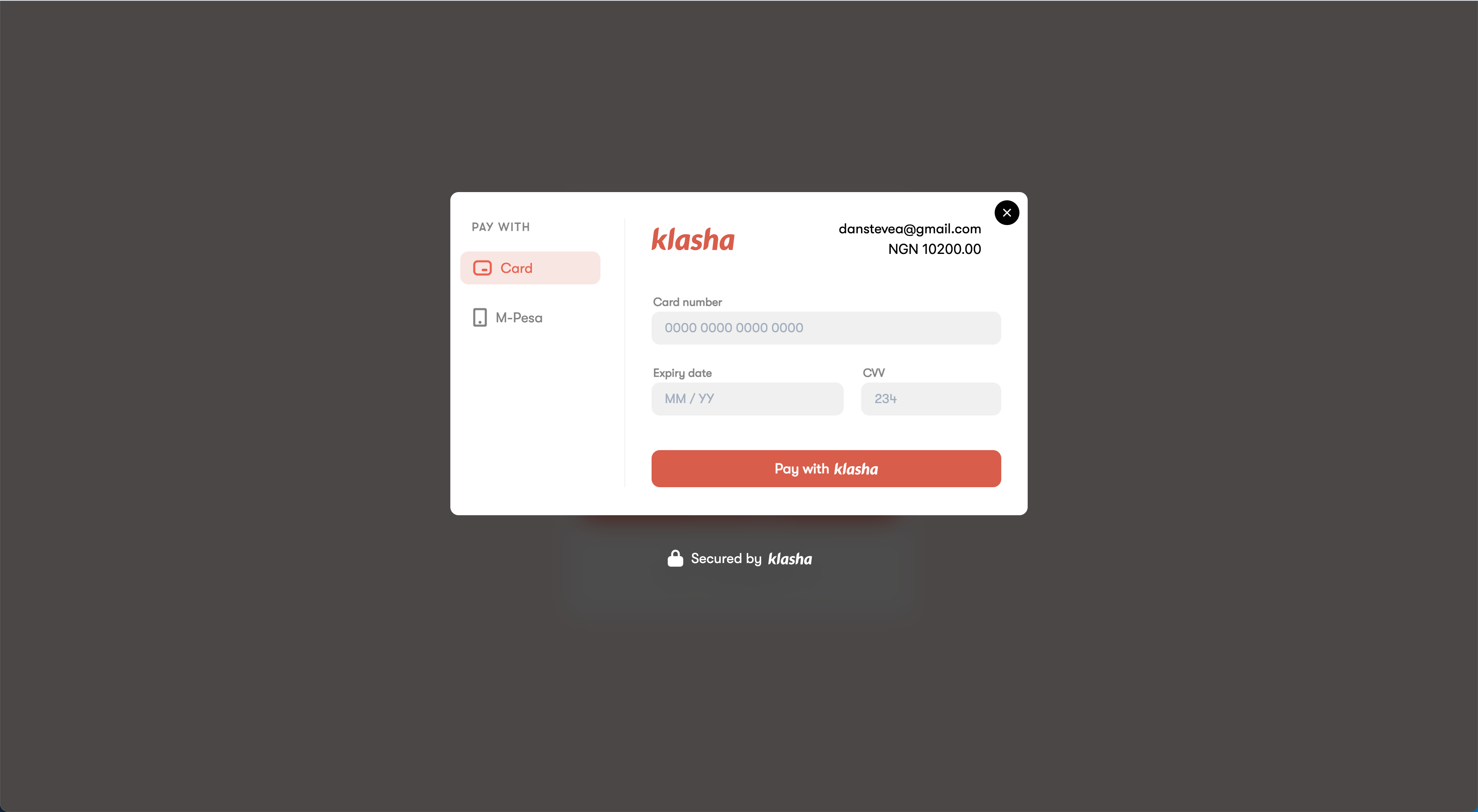This is an angular module that abstracts the complexity of making klasha payments.
npm install --save angular-klashaIn your app.module.ts or any module where the component or directive would be used like so:
import { NgModule } from '@angular/core';
import { AngularKlashaModule } from 'angular-klasha';
...
@NgModule({
imports: [
AngularKlashaModule.forRoot('merchantKey','businessId',false),
]
})
export class AppModule {}There are two available options
-
AngularKlashaComponent: Renders a button which when clicked loads klasha Inline in an iframe
<angular-klasha [fullname]="'some-random-str'" [phone_number]="'some-random-str'" [paymentDescription]="'some-random-str'" [email]="'mailexample@mail.com'" [amount]="'1000000'" [merchantKey]="'some-random-str'" [businessId]="'some-random-str'" [tx_ref]="'some-random-str'" (paymentInit)="paymentInit()" (callBack)="paymentDone($event)" > Pay with Klasha </angular-klasha>
-
AngularKlashaDirective: A directive that loads klasha inline in an iframe when clicked
<button
angular-klasha
[fullname]="'some-random-str'"
[phone_number]="'some-random-str'"
[paymentDescription]="'some-random-str'"
[email]="'mailexample@mail.com'"
[amount]="'1000000'"
[merchantKey]="'some-random-str'"
[businessId]="'some-random-str'"
[tx_ref]="'some-random-str'"
(paymentInit)="paymentInit()"
[class]="'btn btn-primary'"
(callBack)="paymentDone($event)"
>
Pay with Klasha
</button>And then in your component.ts
import { Component, OnInit } from "@angular/core";
@Component({
selector: "app-root",
templateUrl: "./app.component.html",
styleUrls: ["./app.component.css"],
})
export class AppComponent implements OnInit {
tx_ref = '' + Math.floor((Math.random() * 1000000000) + 1);
constructor() {}
paymentInit() {
console.log("Payment initialized");
}
paymentDone(info: any) {
this.title = "Payment Done";
console.log(this.title, info);
}
ngOnInit() {
this.tx_ref ='' + Math.floor((Math.random() * 1000000000) + 1);
}
}Also you can use the klashaOptions object like so:
<button
angular-klasha
[klashaOptions]="options"
(paymentInit)="paymentCancel()"
(callBack)="paymentDone($event)"
>
Pay with Klasha
</button>And then in your component.ts
import { Component } from "@angular/core";
import { KlashaOptions } from "angular-klasha";
@Component({
selector: "app-root",
templateUrl: "./app.component.html",
styleUrls: ["./app.component.css"],
})
export class AppComponent {
options: KlashaOptions = {
email: 'some-random-str',
phone_number: 'some-random-str',
merchantKey: 'some-random-str',
amount: 1000,
sourceCurrency: '',
destinationCurrency: '',
tx_ref: '' + Math.floor((Math.random() * 1000000000) + 1),
businessId: '1',
fullname: 'some-random-str',
paymentDescription: '',
kit: {
currency: '',
phone_number: 'some-random-str',
email: 'some-random-str',
fullname: 'some-random-str',
tx_ref: '',
paymentType: '',
}
;
constructor() {}
paymentInit() {
console.log("Payment initialized");
}
paymentDone(info: any) {
this.title = "Payment Done";
console.log(this.title, info);
}
}Also, you can pass in a merchantKey and businessId in the component and the directive, in such situation, this merchantKey and businessId is given a higher ptx_ref over the global forRoot merchantKey and businessId. For example, if you have this is your file
@NgModule({
imports: [
AngularKlashaModule.forRoot('merchantKey','businessId',false),
]
})and this in your component
<button
angular-klasha
[fullname]="'some-random-str'"
[phone_number]="'some-random-str'"
[paymentDescription]="'some-random-str'"
[email]="'mailexample@mail.com'"
[amount]="'1000000'"
[merchantKey]="'merchantKey2'"
[businessId]="'businessId2'"
[tx_ref]="'some-random-str'"
(callBack)="paymentDone($event)"
>
Pay with Klasha
</button>Then merchantKey2 and businessId2 would be used instead
The function accepts some parameters necessary for processing payment, and they include the following:
| Parameters | Description |
|---|---|
| merchantKey | The key generated by the merchant after creating a business in the merchant dashboard. It can be the public or private key. |
| amount | The amount that is paid by the customer to the merchant. |
| Container id | The id of an empty container div in your code. by default it is generated |
| callbackUrl | The url your customers are being redirected to after processing payment. |
| destinationCurrency | The country code e.g NGN (Nigeria). |
| sourceCurrency | The currency set by the merchant in which the price of goods is displayed. |
| phone_number | The customer’s phone number. |
| The customer’s email address. | |
| fullname | The customer’s full name. |
| tx_ref | The transaction reference number. It calls a javascript function makeid(8) where 8 is the length of the id. The length can be any number you desire and an example format is; klasha-8 to 12 digits-datetime (klasha-0123456789-01022021). |
| Kit | A JSONArray containing the customer’s info as well as the transaction reference. |
Kit can further be broken down into:
| Parameters | Description |
|---|---|
| currency | The currency in which payment is made. |
| phone_number | The customer’s phone number. |
| The customer’s email address. | |
| fullname | The customer’s full name. |
| tx_ref | The transaction reference number. It calls a javascript function makeid(8) where 8 is the length of the id. The length can be any number you desire and an example format is; klasha-8 to 12 digits-datetime (klasha-0123456789-01022021). |
| Call back | A javascript function that is called after the payment has been made. It can return a successful or failed message depending on the status of the transaction. |
For more information checkout klasha's documentation
Please feel free to fork this package and contribute by submitting a pull request to enhance the functionalities.
Why not star the github repo? I'd love the attention! Why not share the link for this repository on Twitter or anywhere? Spread the word!
Don't forget to follow me on twitter!
Thanks! Dansteve Adekanbi.
The MIT License (MIT). Please see License File for more information.
